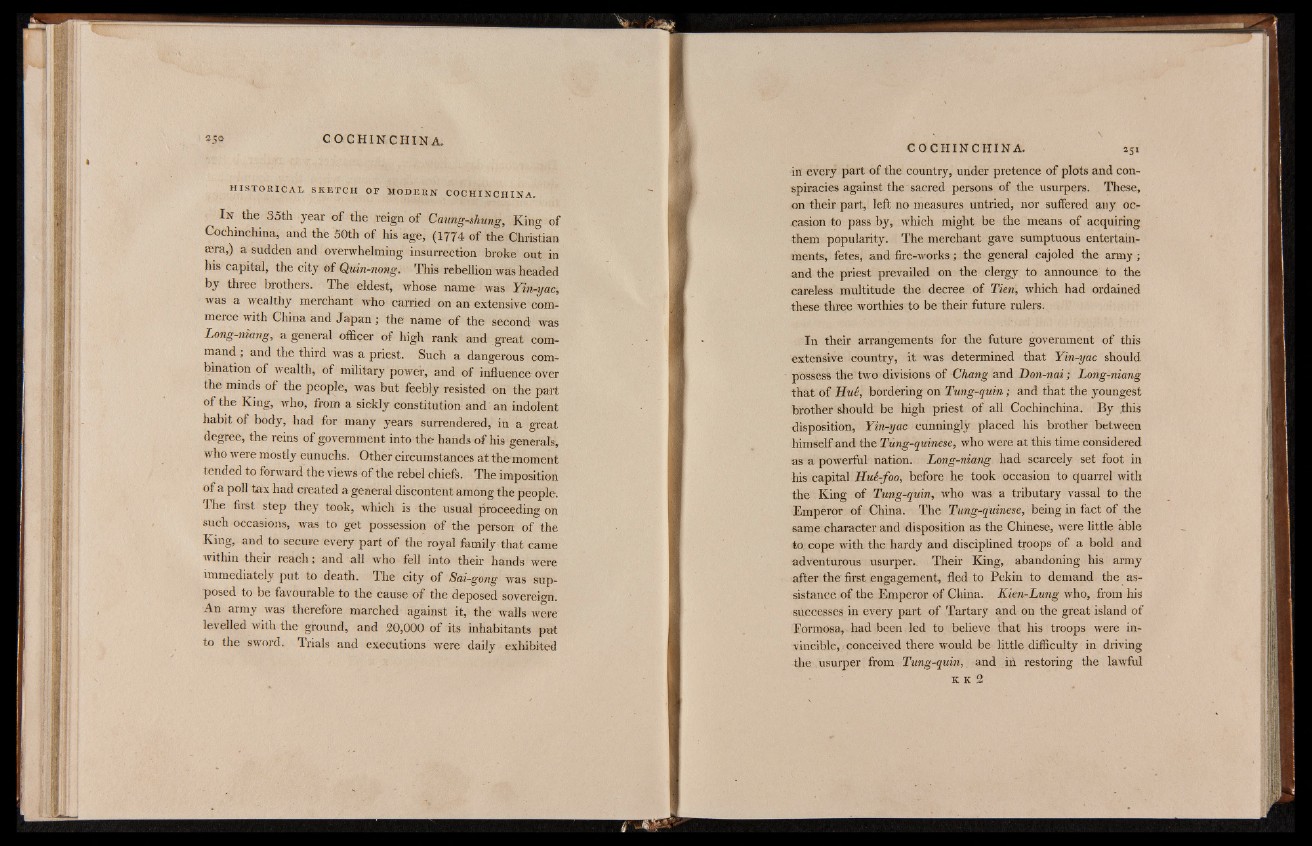
H I S T O R I C A L SK E T C H OF MO D E R N C O C H IN C H IN A .
In the 35th year of the reign of Caung-shung, King of
Cochinchina, and the 50th of his age, (1774 of the Christian
sera,) a sudden and overwhelming insurrection broke out in
his capital, the city of Quin-nong. This rebellion was headed
by three brothers. The eldest, whose name was Yin-yac,
was a wealthy merchant who carried on an extensive commerce
with China and J a p a n ; the name of the second was
Long-niang, a general officer of high rank and great command
; and the third was a priest. Such a dangerous combination
of wealth, of military power, and of influence over
the minds of the people, was but feebly resisted on the part
of the King, who, from a sickly constitution and an indolent
habit of body, had for many years surrendered, in a great
degree, the reins of government into the hands of his generals,
who were mostly eunuchs. Other circumstances at the moment
tended to forward the views of the rebel chiefs. The imposition
of a poll tax had created a general discontent among the people.
The first step they took, which is the usual proceeding on
such occasions, was to get possession of the person of the
King, and to secure every part of the royal family that came
ivithin their reach; and all rvho fell into their hands were
immediately put to death. The city of Sai-gong was supposed
to be favourable to the cause of the deposed sovereign.
An army Avas therefore marched against it, the Avails Avere
levelled with the ground, and 20,000 of its inhabitants put
to the sword. Trials and executions were daily exhibited
COCHINCHINA.
in every part of the country, under pretence of plots and conspiracies
against the sacred persons of the usurpers. These,
on their part, left no measures untried, nor suffered any occasion
to pass by, which might be the means of acquiring
them popularity. The merchant gave sumptuous entertainments,
fetes, and fire-Avorks ; the general cajoled the army ;
and the priest prevailed on the clergy to announce to the
careless multitude the decree of Tien, which had ordained
these three worthies to be their future rulers.
In their arrangements for the future government of this
extensive country, it Avas determined that Yin-yac should
possess the two divisions of Chang and Don-nai ; Long-niang
that of Hué, bordering on Tung-quin ; and that the youngest
brother should be high priest of all Cochinchina. By this
disposition, Yin-yac cunningly placed his brother betAveen
himself and the Tùng-quinese, who were at this time considered
as a powerful nation. Long-niang had scarcely set foot in
his capital Huê-foo, before he took occasion to quarrel with
the King of Tung-quin, who was a tributary vassal to the
Emperor of China. The Tung-quinese, being in fact of the
same character and disposition as the Chinese, Avere little able
to cope with the hardy and disciplined troops of a bold and
adventurous usurper.. Their King, abandoning his army
after the' first engagement, fled to Pekin to demand the assistance
of the Emperor of China. Kien-Lung who, from his
successes in every part of Tartary and on the great island of
Formosa, had been led to believe that his troops were invincible,
conceived there would be little difficulty in driving
the usurper from Tung-quin, J and in restoring the lawful
k k 2